On The Record with Brenda Villa, USA Water Polo Hall of Famer
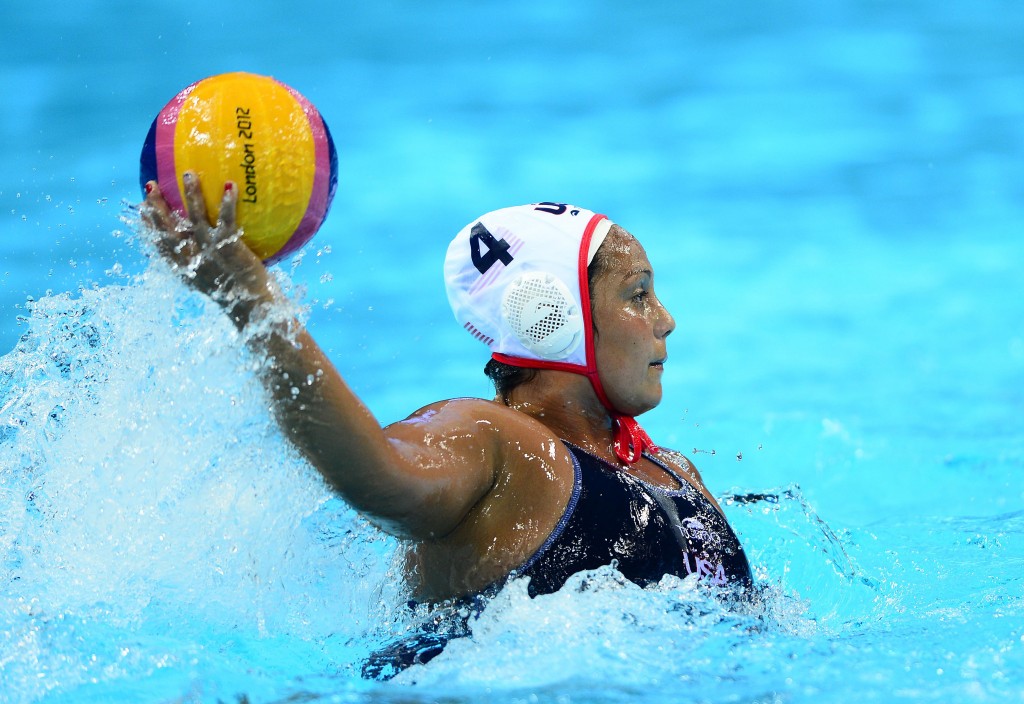
By Michael Randazzo, Swimming World Contributor
Patrolling the Long Center pool deck last weekend in Clearwater, Florida, was Brenda Villa, a four-time Olympian and one of the most accomplished athletes in U.S. water polo history. When Villa and her Team USA teammates scored a decisive finals victory over Spain at the 2012 London Games, they not only captured Olympic gold, they realized a decades-long dream.

In her post-polo career, Villa has become an ambassador of the sport and a much-revered figure. Recently inducted into the USA Water Polo Hall of Fame, Villa is also a member of the executive committee for the Union Americana de Natacion (UANA)—which is why she was in Clearwater for the UANA Junior Pan American Water Polo Championships.
Speaking with Swimming World, Villa explained why South Florida was an ideal location for a multi-national tournament of boys’ and girls’ teams from the Western Hemisphere, the challenges faced by a young U.S. women’s team, the growth of polo throughout the world and what a world-class Olympic athlete does when they retire from the game that has sustained them their entire life.
Why did UANA look to spread its brand in South Florida, where water polo isn’t that well known?
One of UANA’s missions is to promote water polo in all of the Americas. Another is to put on professional tournaments for athletes at the youth and the junior levels. We awarded this bid to the U.S. and trusted that they would make it happen.
It’s always a little bit of a challenge to get everyone in the Americas hosting on a certain level, so that’s UANA’s goal—to have everything be consistent.
We realize that different countries have different resources, so we are trying to support different initiatives. Everyone has a chance to host because it is special to be able to bring the world to your country, to be a great host and to have a home crowd.
I never had a home crowd behind me at any major international events, so I would have loved this—it’s an athlete’s dream. At UANA, we have a dual mission we are trying to fulfill. It’s a challenge, but we see our counterparts playing in Europe and how established they are.
One day we hope to get to that level.
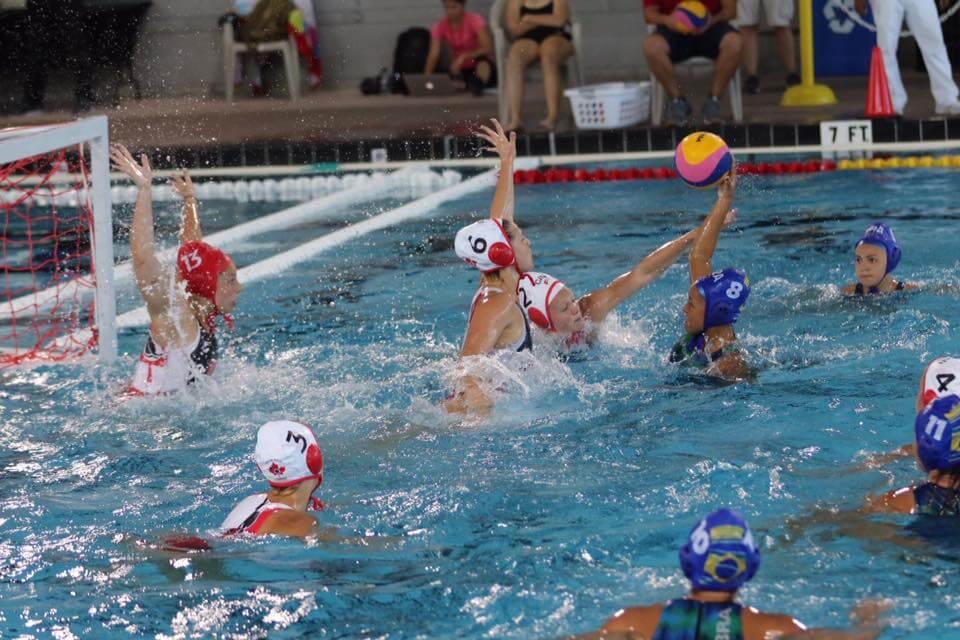
Brazil vs. Canada in UANA Cup Final. Photo Courtesy: Don Utas
– One of the tournament’s great stories was the Argentinian women’s team, which—by beating Puerto Rico on Saturday—qualified for the 2019 FINA World Women’s Junior Water Polo Championships.
I think what’s really both impressive and inspiring is that their program doesn’t have a history of a lot of success, but they’re now going to a higher level international tournament hosted by FINA. More importantly, you can see, in terms of their reactions, how much joy and satisfaction and excitement [they have]. It’s a success for water polo in general and also for women’s water polo
I think any time we get younger levels and age groups qualifying, being excited and then going to the major tournaments, it’s a win. There’s five women’s teams and then eight men’s teams [in Clearwater]; my dream is to have eight and eight. We’re working towards that, but to see these young Argentinian girls getting another opportunity to represent their country and get another chance to play, that’s only going to help girls younger than they are.
That keeps that dream alive, that they can compete at that level, that their hard work is paying off. You see these moments and think: “Great! This is what we need!” But sometimes we have to be patient and realize it is happening, just very slowly.
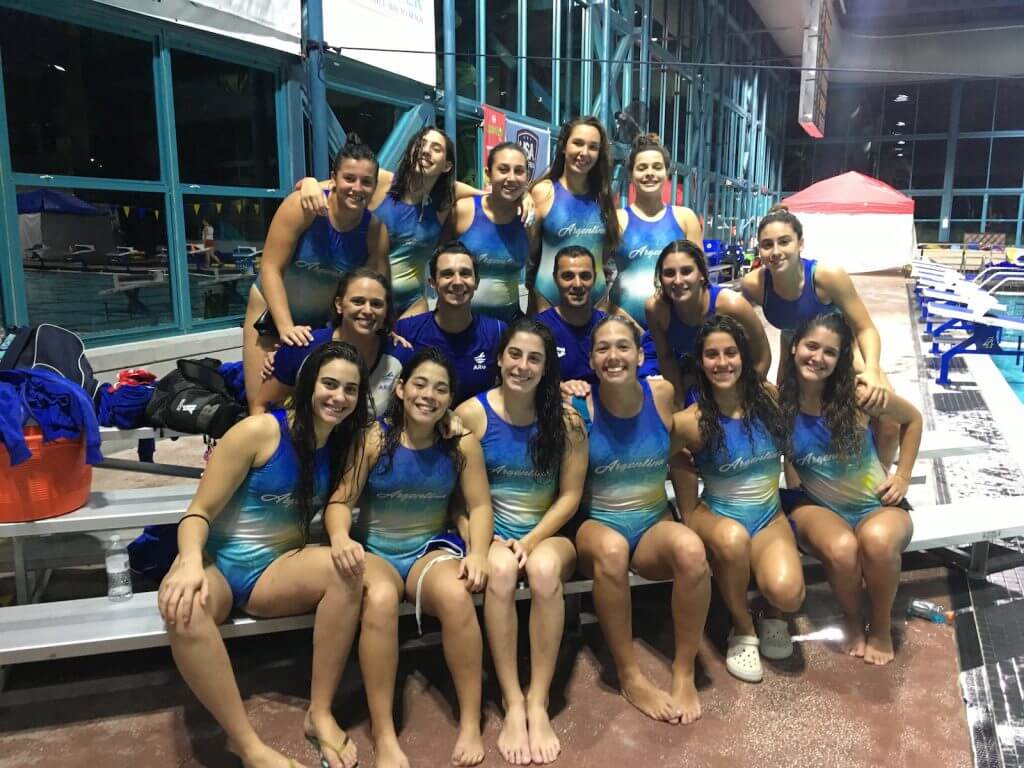
Argentine triumphant – in water polo! Photo Courtesy: M. Randazzo
– An experienced Canadian squad dominated the American women in a UANA Cup semifinal. Could it be that the U.S. coaching staff was more focused on player development than outcomes?
I wouldn’t say that the U.S. isn’t concentrating on outcomes. The goal of this tournament is to qualify [for FINA World Women’s Junior Water Polo Championships]. If you finish first, second, third or fourth, you qualify.
To your everyday person tuning into this tournament, you’d be surprised if the U.S. isn’t in the final game. But, one of the reason our women continue to be dominant is because of the pipeline. For years they’ve been able to send different age groups to different tournaments—which gives you the international experience you need. And, from the outcome this weekend, those girls need that experience.
Yes, they’re playing against an older team and it’s international and more physical but they’re going to take that back with them. And if they ever get the opportunity again in a tournament against older girls, they’ll be okay.
We were a little surprised at the final score—not the outcome—but, it’s a learning experience. How many times in the past have you seen Team USA learning from adversity? It’s not happening as much anymore, so any time [our girls] can get those experiences it’s going to help everyone.
It’s adds to the hunger [for success]. You see how other teams are celebrating, which reminds you that anytime you’re representing Team USA. you’re going to get anybody’s best shot. It doesn’t matter to them what age group; if you’re wearing the red, white and blue, you’re the top team in the world so you have to be ready for that.
– Emily Ausmus, the 12-year-old who’s in the water for Team USA at this tournament, has gotten attention because of her youth. As a teenager, you also got significant minutes on the national team. What’s it like playing with significantly older players?
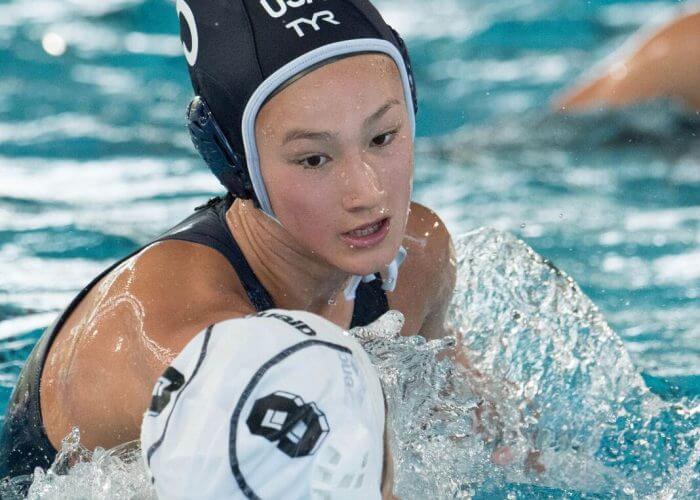
Emily Asmus. Photo Courtesy: Peter Laurence / USA Water Polo
For me, playing on a boys’ team in high school definitely helped in accelerating my career. At 15 I was at Junior World Championships, which is a little older than Emily, but it wasn’t a Pan Ams, it was a world championship. Having the experience of playing with the boys, who were bigger and faster, I had to be thinking about how to prepare two or three plays before. Or make sure that my size or my age or my experience wasn’t a weakness.
Now we’re lucky enough that girls don’t have to play on co-ed teams, they have their own all-girls teams. But there’s something my generation learned—getting roughed up by the boys. One way we can still add that element is by playing up.
– Given the depth of talent in the Olympic Development Pipeline, it’s easy for girls to get discouraged about their shot with the national team. What would you say to them to keep them in the mix?
We have the NCAAs and the college system. That’s a few years where you can be competitive against the best in the country, [or] even in the world, because some of the top talent in Europe comes to play NCAA polo.
It’s exciting to play for your college, so that will hold them over for a bit… but you never know. Annika Dries might have been the second or third youngest on the London team. She only played one Olympics.
I wouldn’t be discouraged if I were a youngster—it gives you another goal. I’m interested to see how many girls play more than two Olympics. If you think of the girls on the team now, there are some that have won two golds. Heather Petrie and I stayed for so long because there was the one thing we hadn’t achieved.
I don’t know how it would have played out if Sydney and Athens were gold. I’m interested to see how long this next generation sticks around. You can’t make a life out of playing water polo, so you have other ambitions and goals, you want your career to get started.
– I imagine you’re busy with many different things, but you obviously keep your hand in the world of water polo as much as possible.
I knew after London that I’d be done. JT [John Tanner], my college coach at Stanford, has always been a mentor, friend. In discussions with him I said: “I’m done, what should I do now?”
I knew it would be a tough transition. How do you dedicate your life to something, you’re at the top for so long and then you have to create a new identity? He reminded me how I talked about giving back and passing it forward because of the program I came from in Commerce–and how much they invest in their youth. I knew I wanted to do something like that and he suggested that I do it in Northern California.
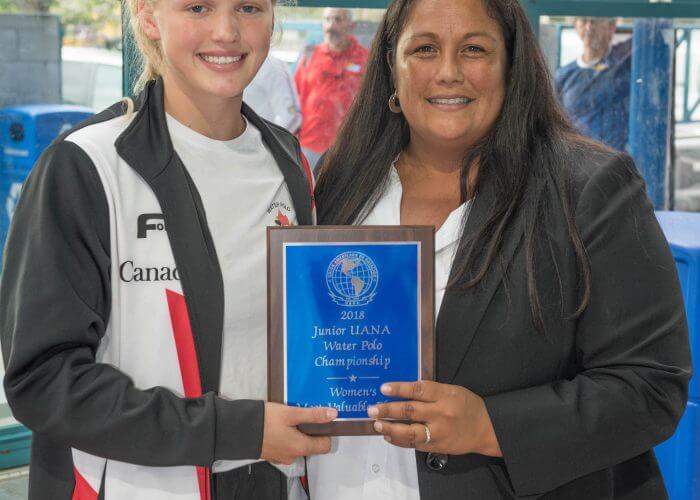
Brenda Villa with Blair McDowell. Photo Courtesy: Peter Laurence / USA Water Polo
We tutored in Palo Alto as a college team [and] I remember feeling at home the most in that neighborhood that I tutored in. He connected me with a few people and that’s how I started my non-profit Project 2020. It’s giving access and opportunity to kids that usually don’t get it, mainly minorities and lower income families.
I’ve been doing that and I also work full time at Castilleja. My position is equity education coordinator, so I do a lot of stuff in our department about awareness and compassion engagement—things that I was already doing, but didn’t know there was a name for it.
It’s an all-girls private school in Palo Alto. I never thought I’d be at a private school, but the girls there are definitely motivated. The thought process of why it’s important to give women a space to grow, is something I love and enjoy. It’s been great. Of course, my husband says: “You’re not even playing anymore, but you’re still on a pool deck all the time.”
I’ve never really left water polo. I’m coaching, I’m on the board of USA Water Polo. I want the sport to be diverse, I want it to be global, but if I’m not willing to put in that time, how do I expect others to? I know I can’t do it by myself, but I still have to be invested past my playing career in order to encourage others to do the same. Some day we will be a global sport and more diverse, so those are the things that keep me interested and keep me involved in so many different areas of the sport.
-There’s so many attributes and accolades that you’ve earned both individually and with your teammate, but one of the most compelling is that you were one of the group of women that transformed the sport, both in this country and internationally.
There was definitely a lot of work and commitment, but I was incredibly lucky because Commerce was so instrumental the development of the women’s game. They hosted the first women’s international tournament in the US, they did so many firsts for women and the city always supported that.
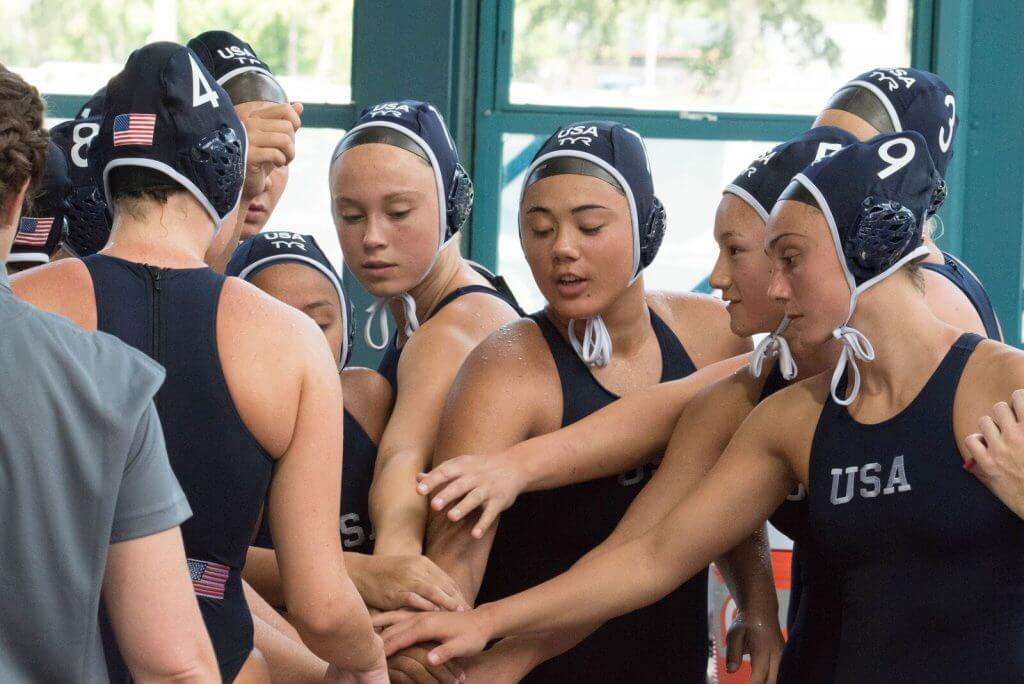
Photo Courtesy: Peter Laurence / USA Water Polo
I just feel lucky that I was born at the right time to take advantage of Title IX and to have these role models that didn’t get all the opportunities I did. I was always inspired in that sense. Then I got the chance to play overseas and I got to see their model. It made me feel luckier that we have sports that are associated with school, they don’t really do that in Europe.
I think [the U.S. is] dominant because we have all these opportunities that other countries don’t, especially on the women’s side. I love being connected now and seeing teammates of mine overseas doing clinics—the things we’ve been doing in the US for years, but it’s just a way to keep female players coaching and staying in the game.
It inspires me and makes me happy to see other women coaching and being assistants on men’s teams and coaching club teams. We need more of this. If we’re not, no one else is going to do it.



